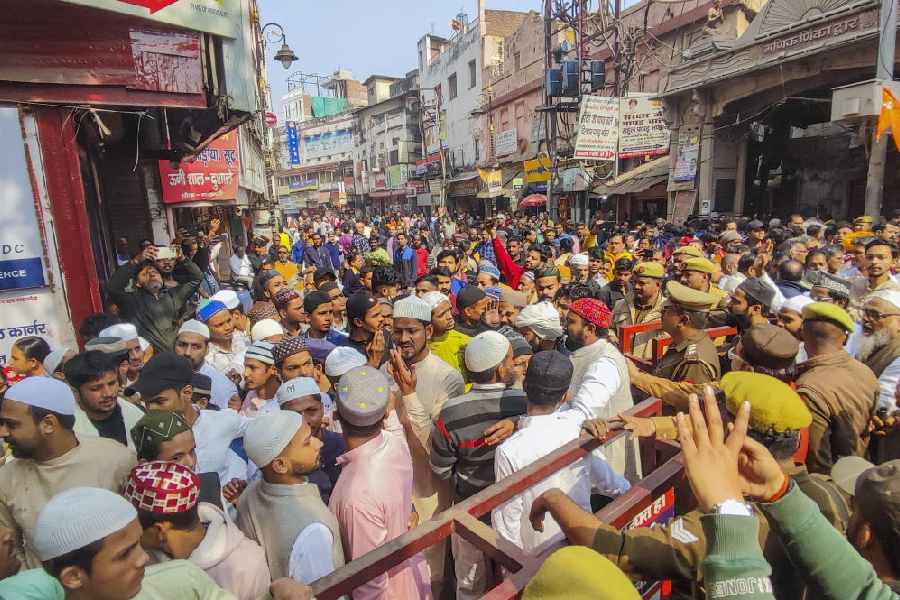Several senior clerics and Muslim leaders on Friday expressed the community’s anguish at recent legal and administrative developments over Varanasi’s Gyanvapi Mosque, suggesting the judiciary and bureaucracy were “grossly compromised” but saying they still had faith in justice and democracy.
The pain, expressed at a news conference in Delhi, found an echo in Varanasi where 3,000 namazis — six times the usual number — prayed at the mosque on the first Friday after its basement was opened to Hindus for worship on a district court’s orders.
Mosque committee members said the numbers reflected the “simmering discontent in the community”, which also observed a bandh in Varanasi city.
At the Delhi news conference, organised by the All India Muslim Personal Law Board, Maulana Mahmood Madani of the Jamiat Ulama-i-Hind (JUH) said: “It won’t be wrong to say that we are seen as enemies and are being treated as such.”
He added: “Upholding the rule of law is everyone’s responsibility. ‘Might is right’ is the law of the jungle. If might is right then remember, might changes hands.”
The comments came against the background of Wednesday’s order by the Varanasi district court allowing Hindu worship in the basement; Allahabad High Court’s refusal to stay the order on Friday; and the district court’s order for an ASI survey of the Gyanvapi compound on another petition that alleges the mosque was built after demolishing parts of the original Kashi Vishwanath Temple.
The ASI report purportedly says that Hindu idols are buried under the compound, buttressing the claims of the Hindu side which wants the mosque shifted. The mosque authorities have contested the findings.
A joint statement was released at the news conference. In it, the Personal Law Board, both factions of the JUH (a clerics’ body), the Markazi Jamiat Ahle Hadith Hind, Shahi Imam Mukarram Ahmed of Delhi’s Fatehpuri Masjid, the Jamaat-e-Islami Hind and the All India Majlis-e-Ittehadul Muslimeen requested the President and the Chief Justice of India to address their fears that the judiciary and bureaucracy “have been grossly compromised”.
“The swift initiation of this action (puja at the Gyanvapi basement), despite the court granting a seven-day window for the administration to make necessary arrangements, raises questions about apparent collusion between the administration and the plaintiff, attempting to foreclose any effort by the Mosque Managing Committee to pursue remedies against the District Court order…. It is imperative to clarify that no pooja was ever conducted in this basement (before),” it said.
“The continued silence on the Place of Worship Act 1991 by the Supreme Court has become a source of deep worry for the Muslim community in the country…. We believe that this time the dignity of the country and the impartiality of the judicial system and administrative affairs have been grossly compromised.”
The 1991 Act stipulates status quo on the nature of places of worship as they existed on August 15, 1947, with the exception of the Ramjanmabhoomi-Babri Masjid site. However, several court cases have been filed seeking that the site of the Gyanvapi and that of the Shahi Idgah Mosque in Mathura’s “Krishna Janmabhoomi” be handed over to Hindus to build temples.
Some Muslim intellectuals have suggested the community voluntarily hand these places over to Hindus.
Responding to this, JUH secretary Niaz Farooqui told The Telegraph: “When have you given us the opportunity to? After the Babri verdict, there was peaceful acceptance. Yet, now, might is being enforced and people are being forced to give up these mosques as well.”
Speaking from Varanasi, a member of the mosque committee who sought anonymity told this newspaper: “We can intermittently hear chants of ‘Har, Har Mahadev’ from the basement and are feeling suffocated.”
While Vyas family members and priests from the Kashi Vishwanath temple conducted puja, the administration installed a grille window from the temple side for ordinary devotees to watch the puja from 18ft away. The temple and the mosque share a compound.











